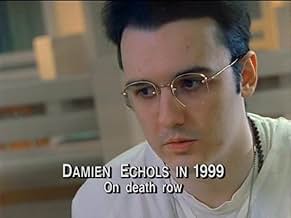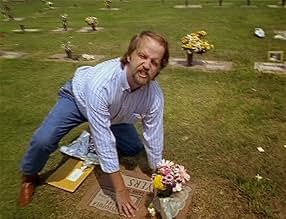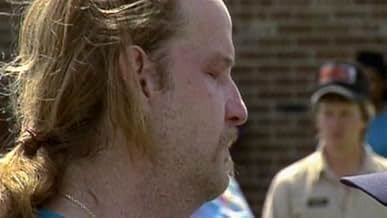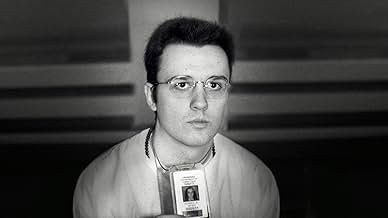América Nua e Crua: Paraíso Perdido 2
Título original: Paradise Lost 2: Revelations
AVALIAÇÃO DA IMDb
7,5/10
10 mil
SUA AVALIAÇÃO
Adicionar um enredo no seu idiomaThe case of the West Memphis Three, its questionable circumstances and the parties involved are followed up years later.The case of the West Memphis Three, its questionable circumstances and the parties involved are followed up years later.The case of the West Memphis Three, its questionable circumstances and the parties involved are followed up years later.
- Indicado para 1 Primetime Emmy
- 2 vitórias e 1 indicação no total
Melissa Byers
- Self
- (cenas de arquivo)
Tim Sullivan
- Self
- (sonoplastia)
Jessie Misskelley
- Self
- (as Jessie Miskelly)
Avaliações em destaque
Okay. Mark Byers is a wing-nut. So what. Documentary #1: Documents a witch hunt. No question. I'm totally on board. New trial - let's go. Documentary #2: Perpetrates a witch hunt. Drips with unintentional irony. That people can be put away for life and lethal injection based on no physical evidence or common sense even is chilling. That a documentary (and the convicted themselves) can then come along and blithely point fingers, also with no evidence, is no less chilling. And who ARE these Internet activist people? Do they have jobs or what? They are as asinine and loopy as Byers. The filmmakers should have just left it at film #1 and been done with it. But the awards and following went to their heads and they decided to crusade. Ugh.
Generally riveting follow up of the case where three quite possibly innocent young men sit in prison for murdering three children.
Certainly, at least given what the two documentaries show, there is way beyond 'reasonable doubt' that they're responsible. But what was a moderate flaw in the first film becomes worse here; In the same way the prosecution disturbingly made the evidence fit their theory, throwing out, ignoring, or belittling what didn't fit, the film-makers seem to play some of the same game in reverse.
Crucial questions about alibis are never answered, and this sequel spends too much energy trying to pin guilt on Mark Byers, step-father of one of the murdered boys.
Is there some spooky circumstantial evidence that he may have been involved? Absolutely. But proof? The man even voluntarily takes a lie detector test, and passes with flying colors, which the film- makers then dismiss since the man is on various prescription mood altering drugs. But do we ever hear an expert say those drugs might affect the test? No.
More disturbing, the film seems to imply he's guilty because he looks and acts weird, and says confusing and contradictory things, the very sort of 'guilt by odd behavior' association both films attack in relation to the three boys found guilty. The fact that Byers (supposedly) has a brain tumor, and what effect that might have on his outward behavior is never explored at all. And watching this character at such length starts to get dull after a while, as his rants go on and on.
None-the-less, this is still a very interesting film, the most moving sections being those spent with the three now young men in jail for a crime they likely didn't commit. All have grown up a great deal in the 4 years since the last film, and are sad and articulate reminders of how horrifying it can be that people never given the benefit of a fair trial are allowed to sit and rot in prison. And the amazing lack of despair or bitterness they show is a testament to human resilience.
Certainly, at least given what the two documentaries show, there is way beyond 'reasonable doubt' that they're responsible. But what was a moderate flaw in the first film becomes worse here; In the same way the prosecution disturbingly made the evidence fit their theory, throwing out, ignoring, or belittling what didn't fit, the film-makers seem to play some of the same game in reverse.
Crucial questions about alibis are never answered, and this sequel spends too much energy trying to pin guilt on Mark Byers, step-father of one of the murdered boys.
Is there some spooky circumstantial evidence that he may have been involved? Absolutely. But proof? The man even voluntarily takes a lie detector test, and passes with flying colors, which the film- makers then dismiss since the man is on various prescription mood altering drugs. But do we ever hear an expert say those drugs might affect the test? No.
More disturbing, the film seems to imply he's guilty because he looks and acts weird, and says confusing and contradictory things, the very sort of 'guilt by odd behavior' association both films attack in relation to the three boys found guilty. The fact that Byers (supposedly) has a brain tumor, and what effect that might have on his outward behavior is never explored at all. And watching this character at such length starts to get dull after a while, as his rants go on and on.
None-the-less, this is still a very interesting film, the most moving sections being those spent with the three now young men in jail for a crime they likely didn't commit. All have grown up a great deal in the 4 years since the last film, and are sad and articulate reminders of how horrifying it can be that people never given the benefit of a fair trial are allowed to sit and rot in prison. And the amazing lack of despair or bitterness they show is a testament to human resilience.
But not for the right reasons.
The snickering, smug arrogance of the filmmakers, who seem to have more screen time than anyone actually involved in the case, made me see this documentary as just a vanity project. I couldnt even buy the patronizing solicitude they showed towards one defendant (undoubtedly because he is the most photogenic of the three convicted of the crime).
There is a definite travesty of justice here, but getting to the truth seems to have become secondary to the childish delight with which the filmmakers show how much smarter they are than anyone else.
Their hearts may indeed be in the right place, and they truly want to see justice served, but this kind of flagrant self-aggrandizment does not do justice to anyone.
The film offers no real evidence as to the identity of the "real" killer, beyond the filmmakers' own speculation and innuendo - which is precisely what convicted the three boys they are trying to "save" in the first place.
The snickering, smug arrogance of the filmmakers, who seem to have more screen time than anyone actually involved in the case, made me see this documentary as just a vanity project. I couldnt even buy the patronizing solicitude they showed towards one defendant (undoubtedly because he is the most photogenic of the three convicted of the crime).
There is a definite travesty of justice here, but getting to the truth seems to have become secondary to the childish delight with which the filmmakers show how much smarter they are than anyone else.
Their hearts may indeed be in the right place, and they truly want to see justice served, but this kind of flagrant self-aggrandizment does not do justice to anyone.
The film offers no real evidence as to the identity of the "real" killer, beyond the filmmakers' own speculation and innuendo - which is precisely what convicted the three boys they are trying to "save" in the first place.
You can absolutely skip part 2 of paradise lost and just watch part 1 and 3.
They made a faux paus here where they focused their attention on a crazy guy that they tought was guilty and gave him way too much screen time. After watching part 3 this film feels inconsequential and a waste of time.
All of this is pretty funny considering the hypocracy of acusing someone of something with no evidence just because they are different, like the police and prosecuters did with Damien.
I gave parte 1 and 3 both 9/10, they were great and the Metallica music fits perfectly with the themes of these documentaries and it's connection to the kids.
They made a faux paus here where they focused their attention on a crazy guy that they tought was guilty and gave him way too much screen time. After watching part 3 this film feels inconsequential and a waste of time.
All of this is pretty funny considering the hypocracy of acusing someone of something with no evidence just because they are different, like the police and prosecuters did with Damien.
I gave parte 1 and 3 both 9/10, they were great and the Metallica music fits perfectly with the themes of these documentaries and it's connection to the kids.
Damien Echols, Jessie Misskelley, Jr., and Jason Baldwin were convicted in 1994 for the murder of three boys in West Memphis, Arkansas. It's 1999 and Damien has his final appeal in front of Judge David Burnett. The popularity of the original documentary has inspired support group, Free the West Memphis Three. Cameras are no longer allowed in the court. Of the victims' family, only John Mark Byers is cooperating with the filmmakers and he has a lot to say. He also has had a lot of legal problems. His wife died in 1996. He takes a lie detector test in front of the camera. The defense team seems to be concentrating on bite marks on the boys.
Byers is a big part of this follow-up. He's a very odd character and the movie is trying to make him suspicious. It's a lot of innuendos. Without being able to film the court proceedings, this is left without its main narrative. It becomes obviously one-sided. The support group adds very little to overwhelming need of this sequel. It needs to solve the murders or get the West Memphis Three out. This achieves neither. This could have been a shorter film to update the situation.
Byers is a big part of this follow-up. He's a very odd character and the movie is trying to make him suspicious. It's a lot of innuendos. Without being able to film the court proceedings, this is left without its main narrative. It becomes obviously one-sided. The support group adds very little to overwhelming need of this sequel. It needs to solve the murders or get the West Memphis Three out. This achieves neither. This could have been a shorter film to update the situation.
Você sabia?
- CuriosidadesThe only film of the trilogy to be a TV project instead of receive a theatrical release.
- Erros de gravaçãoAt one point the on-screen date for a trial scene is listed as January of 1993. The murders didn't occur until May of that year.
- Trilhas sonorasWelcome Home (Sanitarium)
Performed by Metallica
Written by James Hetfield, Lars Ulrich, and Kirk Hammett
Produced by Flemming Rasmussen with Metallica
Principais escolhas
Faça login para avaliar e ver a lista de recomendações personalizadas
Detalhes
- Data de lançamento
- País de origem
- Idioma
- Também conhecido como
- Paradise Lost 2: Revelations
- Locações de filme
- Empresas de produção
- Consulte mais créditos da empresa na IMDbPro
- Tempo de duração
- 2 h 10 min(130 min)
- Cor
Contribua para esta página
Sugerir uma alteração ou adicionar conteúdo ausente
























